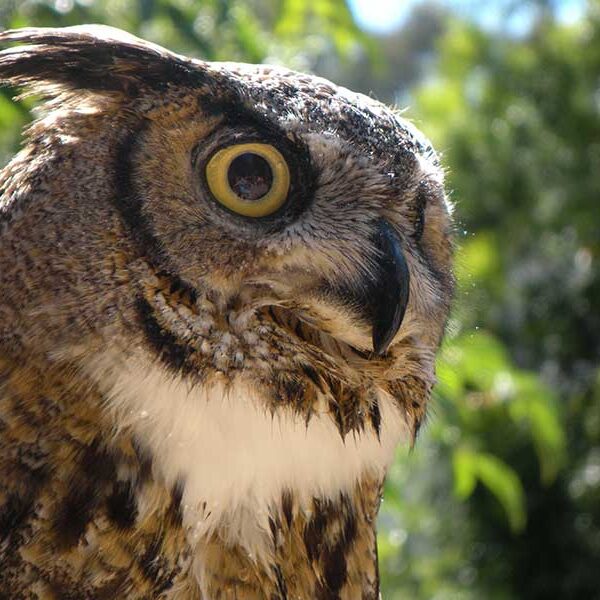Animals
Great Horned Owl

Latin Name
Bubo virginianus
History at CuriOdyssey
She was found on the ground in the East Bay and was taken to the Lindsey Wildlife Museum Rehabilitation Center. When they examined her they noticed that she was missing half of her left wing. Although part of the wing was missing it had healed completely and she had no other injuries. Because the wing had a clean break it was assumed that the injury was caused by a car or power line. She was transferred to us in November 1995.
Fun Facts about Great Horned Owls
Our Great Horned Owls enjoys getting baths on hot days and will even let keepers water her with a hose or stand under a sprinkler to cool off.
What do Great Horned Owls eat?
Anything that is small enough for them to kill, including rodents, rabbits, snakes, baby raccoons, and skunks. At CuriOdyssey, they are served mice, rats, chicks, quail, and rabbit.
How long do Great Horned Owls live?
In the Wild: Up to 14 years.
In Captivity: 30 to 40 years, the oldest recorded is 50.
Where do Great Horned Owls live?
This owl will inhabit almost any type of environment from dense forests, plains, and deserts to city parks. They range in North and South America.
Are Great Horned Owls endangered?
Great Horned Owls have no special wildlife conservation status, although they are protected under the U.S. Migratory Bird Treaty Act.
SPONSOR AN ANIMAL
Help provide for the care and feeding of our wildlife guests by sponsoring an animal of your choice for a year.
Join the CuriOdyssey Community
LOCATION
1651 Coyote Point Drive
San Mateo, CA 94401
Ohlone Land Acknowledgement
650-342-7755
info@curiodyssey.org
CuriOdyssey is a 501(c)(3) non-profit, Tax ID 94-1262434

